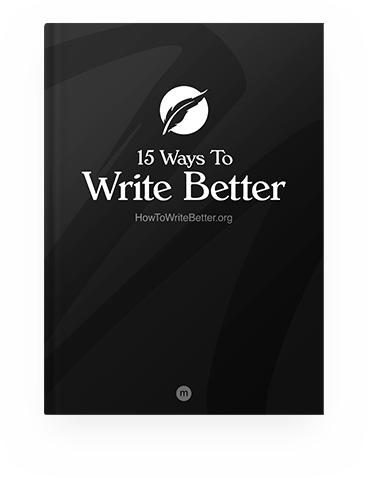We are all writers now. Whether you write books, blog posts, emails, Instagram captions, or text messages, you are a writer. No matter your preferred medium, here are a few tips to help you write more effectively.
Treat text messages like prose. Before hitting the send button, review your text: spelling, content, punctuation. Ask yourself: What am I attempting to communicate? What am I attempting to express? Be more deliberate with your most common form of casual writing, and you’ll automatically become more deliberate in other mediums.
Words are tools. Expand your vocabulary to make your writing more precise. There’s no need to use a ten-dollar word when a ten-cent word will suffice, but having more tools in your toolbox will allow you to select the most appropriate tool for the job. Sometimes you need an ax, sometimes you need a scalpel. Pick one new word each day, and then use it at least 21 times in your conversations with others that day. The most useful words will stick, and your vocabulary will expand over time.
Do it daily. If you want to improve your writing, write every day. Writing is a muscle: if you don’t use it, you lose it. For me, the best way to guarantee consistent writing was to start a blog. (Related article: How to Start a Successful Blog Today.)
Punctuation. Is. Pace. To add variety, velocity, and cadence to your writing, play around with different punctuation: periods, commas, em dashes, colons, semicolons. Short, succinct sentences communicate tension. Longer, run-on sentences, on the other hand, help establish a frantic, hurried rhythm—a feeling that the pace is picking up as the words tumble onto the page.
Avoid throat-clearing. Blogs, books, and social media posts are littered with unnecessary intros, solipsistic digressions, and avoidable drivel. Ditch the nonsense and state your points. When in doubt, delete your first two paragraphs and see whether the writing improves.
Don’t waste the reader’s time. Our time and our attention are two of our most precious resources. It is selfish to force a reader to spend fifteen minutes reading something you could’ve—and should’ve—communicated in 90 seconds. If you want to earn your reader’s trust, don’t waste their time.
30% composition, 70% editing. For every hour you spend writing, spend three hours editing, shaping your work into something more concise, more powerful—more beautiful. Writing truly is rewriting.
Narrative urgency. Every sentence must serve a purpose: Your first sentence must make the reader want to read the second. The second sentence must propel the reader to the third. So forth and so on until the very end. If a sentence doesn’t move the narrative forward—if it doesn’t make the writing more urgent—then it must hit the cutting-room floor, no matter how clever or precious it seems.
Avoid too many adverbs. A sure sign of amateur writing is the overuse of adverbs, especially -ly adverbs. A woman in a story isn’t incredibly pretty—she’s beautiful; the sky isn’t very blue—it’s azure. Find the perfect words to avoid using adverbs as crutches.
Follow the rules, and then unfollow the rules. Learn the rules so you can break them successfully. I recommend two books to my writing students to help them understand the guidelines of good writing: Grammatically Correct and Garner’s Modern English Usage.
Read more about writing. No matter your level of competency, there’s always room for improvement. For daily tips and writing-related articles, follow How to Write Better on Facebook and Twitter, and subscribe to the free How to Write Better newsletter.
If you’re serious about improving your writing, and you’re willing to put in the time and effort, I teach a dozen new students each month in my four-week online writing class, How to Write Better.

15 Ways to Write Better
We are all writers now. Whether you write books, blog posts, or Instagram captions, you are a writer. This short ebook contains fifteen tips to help you write more effectively.
You May Also Enjoy
How to Start a Successful Blog TodayLearn how to start a blog in less than an hour. Follow the step-by-step instructions we used when starting our blog, which now has reached more than 20 million people. Creating this blog is one of the best decisions Ryan and I ever made. After all, our blog is how we earn a living. More important, it's how we add value to other people's lives. Read more
30-Day Minimalism GameLet's play a simple game together. We call it the 30-Day Minimalism Game. Find a friend, family member, or coworker who's willing to minimize their stuff with you next month. Read more


